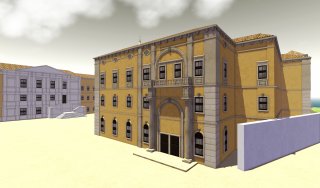Evento completo
20 Jul
a
03 Out
11th International Conference on Urban History
Cities & Societies in Comparative Perspective

Prague (29 August -1 September 2012)
Virtual Historic Cities: a Laboratory in Urban History (session M10)
The emerging field of virtual archaeology, and particularly the application of virtual worlds technology to the recreation of historical sites, has opened a new area of research for the study of Urban History. The technology of virtual worlds fosters the recreation of historic (urban, architectural and social) realities that have disappeared, and at the same time allows continuous examination of the new available historical sources. In fact, this novel approach to historic research enables not only a global outlook of the object of study, but also the testing of the fragmented and dispersed existing sources in an interactive three-dimensional representation. The model becomes concurrently an instrument and an object of study. The most recent developments in virtual world technology have contributed greatly to this new line of study as they promote interaction between users and researchers in an immersive and easily built collaborative space in real time. These characteristics foster the coordination of researchers when confirming historical hypotheses, allowing dynamic and constant changes of the virtual model at a low cost. They also propitiate social interaction with the immersion in a lost urban reality to a wider audience, thus promoting the didactic and leisure dimensions of these undertakings. The increasing interest of the scientific community in these projects has led to the first regulation of this emerging scientific field, aiming to ensure the historical accuracy of the models (The London Charter, 2006). We are seeking to discuss the state of the art of this field of study and its place in the extended subject of Urban History.
This session invites participants to consider (but is not restricted to) the following ideas:
- Is the application of virtual world technology to historic research effectively broadening and enhancing the traditional context of the latter?
- What are the limits and possibilities of these virtual environments for historical research?
- How can we define conceptually and methodologically this new approach to the study of Urban History?
- Is it possible to establish international quality standards such as the London Charter?
- Current projects on virtual reconstruction use diverse software and applications available in the market; would it be better to develop software with the ideal requirements for historical research and reconstruction?
- What are the potentialities of this new approach with regard to the promotion of comparative research, in an international context?
Session chairs: Helena Murteira (CHAIA, Universidade de Évora, Portugal) helena.murteira@arteportugal.pt; Joaquim Carvalho (Universidade de Coimbra, Faculdade de Letras, Portugal) joaquim@dei.uc.pt; Laura Fernandez-Gonzalez (The University of Edinburgh, Department of Architecture) l.fernandez-gonzalez@sms.ed.ac.uk
For more information, please visit the website of the conference on www.eauh2012.com






